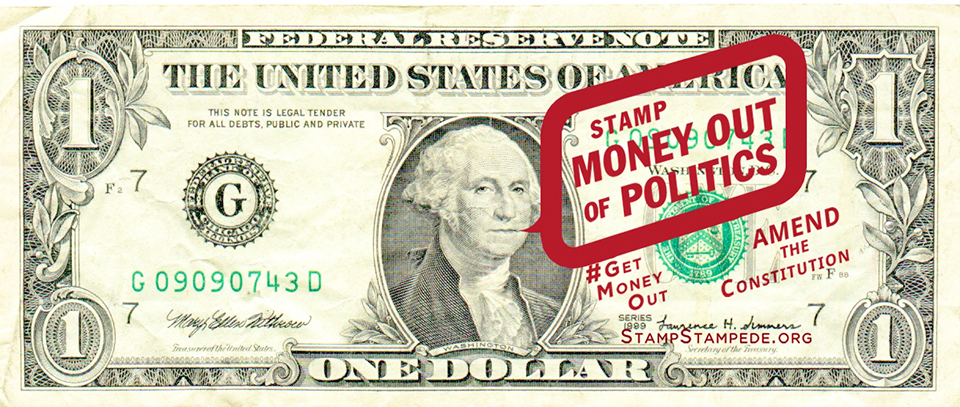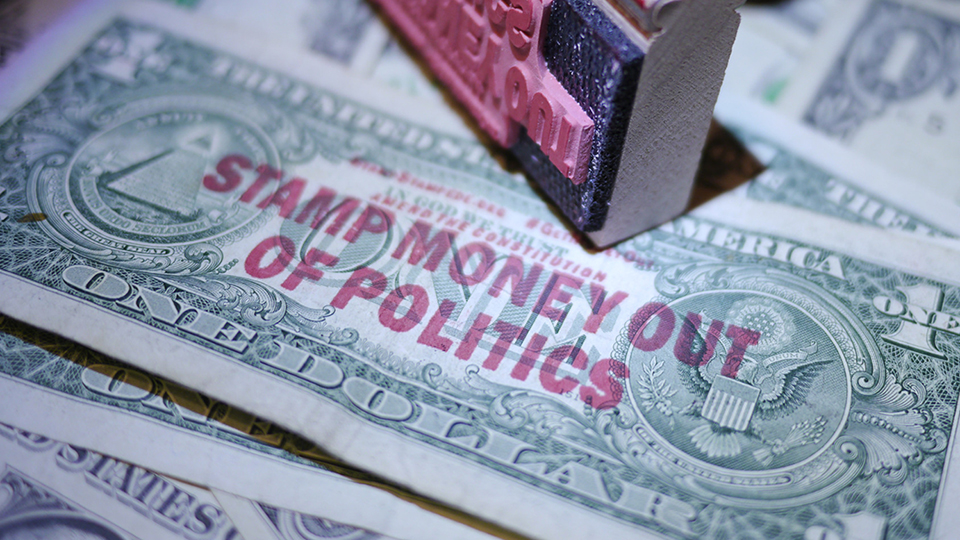Most Americans want to take money out of government but don't think it's possible. Here's a plan for overcoming our defeatism.
In the wake of the Supreme Court’s latest outrage, McCutcheon v. FEC, striking down aggregate limits on campaign contributions, reformers are asking an urgent question: Can the issue of money in politics ever really matter in an election? Could the fight against the corrupting influence of money finally rally the people?
Chris Cillizza at the Washington Post is skeptical. In an essay in March, Cillizza observed that a new GW Battleground poll found that six of 10 Americans were "entirely unmoved/unaffected by the recent focus by Democrats on villainizing the Kochs." Indeed, 52 percent didn't even know who the Koch brothers were. From this, Cillizza concludes that it makes no sense to make "campaign finance or money in politics" an issue in this, or any campaign. As he writes:
"[V]oters almost never use campaign finance or money in politics as a voting issue. Yes, in polls people will say there is too much money in politics and that it's a bad thing. But, time and time again in actual elections they don't vote on it."
Cillizza's view is commonplace—and true, when focused on normal politics, the politics of ordinary politicians, battling it out in ordinary elections. But it collapses a bunch of different points that, when separated, suggest a very different possibility, at least for a different kind of politics.
First: Americans overwhelmingly believe it “important” to “reduce the influence of money in politics”—more than 90 percent, according to a recent poll by the Global Strategy Group. This is the critical point to keep in view: Whether or not we Americans can recognize the "Kochs," we certainly recognize a system of corruption. The vast majority of us — 75 percent according to a poll by Reason — do.
So then why don’t we “vote on it”? Why is money in politics “almost never … a voting issue”?
A hint at the answer is the second point: While the Global Strategy Group found that more than 90 percent of Americans believe it important to reduce the influence of money in politics, they also found that more than 90 percent believe such influence just won’t be reduced anytime soon. We want it to be reduced, we believe it important, but we also believe we won’t get it. We thus resign ourselves to a corrupt status quo, and move on to other issues.
But why? There are plenty of proposals out there for fundamental reform, and at least a few (e.g., the Government by the People Act, or theAmerican Anti-Corruption Act) that would genuinely change the system. If we, the people, want reform so much, why then don’t we rally to those who push it?
This is the third, and most difficult point: In July 2012, the Clarus Research Group asked this question:
"When Congress passes laws that affect the way political campaigns are financed, do you think these laws have been designed more to help current members of Congress get re-elected or do you think these laws have been designed more to improve the system?"
Eighty percent of Americans said they thought that reforms were only self-serving, designed only to "help current members of Congress get re-elected." We want reform. We just don’t trust that we can actually get it. We believe we have a corrupt system. But we don’t believe insiders when they tell us they will fix it.
This is the politics of resignation. We accept the status quo not because we want it, and certainly not because we don’t care about “process.” To the contrary: We are resigned precisely because we view the very process by which we would effect change as corrupt. We thus steer away from the politics of reform, and focus our (dwindling level of) political attention on other issues instead.
This is reform’s greatest challenge. The ordinary way we do politics in America—Democrats yelling at Republicans, Republicans yelling at Democrats—won’t move this issue, because neither side will seem credible as reformers, at least as against the other. That is Cillizza’s sensible, and unfortunately true, point.
But what if we could crack this cynicism, and melt the resignation? What if there were a way to give Americans hope—not that ordinary politicians could be different, but that a different kind of political power could matter? Not one from the inside, but one born on the outside. Not a power seeking political office, but a power seeking to change the way politics works. Americans might not rally to yet another politician promising change. That’s Cillizza’s insight. But could they be rallied to a cause that would change the way politicians promise?
Such a movement is this generation’s moonshot. Yet the reformers I know—as decent and committed as anyone could imagine—think small. They call their thinking “realistic.”
But it is precisely this “realism” that begets our resignation. If we’re going to crack it, we need escape velocity. A Saturn V, not a belief inFlubber. A thunderclap, not a few more reformist members of Congress. We must show Americans something unlike anything they’ve seen before. We must give them a reason to believe—plausibly—that something fundamentally different is possible.
A moonshot takes a president, and a Congress.
It may still be possible, Obama’s bait and switch on reform notwithstanding, for a regular presidential candidate credibly to commit his or her campaign to reform. Maybe especially a Republican, for, as when Nixon went to China, a Republican committed to reducing the influence of money in politics would surprise us. It would give us a sense that something different was really possible. The New Hampshire Rebellion is working hard to create the conditions in that first primary state to inspire just such a candidate. We’ll see how far they get.
But if no ordinary candidate makes this the issue, then maybe we should begin to think about an extraordinary one. A public figure with enormous respect—think David Souter or Christine Todd Whitman or Michael Bloomberg—who runs a campaign with a single promise: that if elected, he or she will hold the government hostage until Congress passes fundamental reform; and then once that reform is enacted, will resign—leaving the vice president to become president.
Think of this as president-as-bankruptcy-judge, taking control for the single purpose of reorganizing a government, and once finished, turning it back to the politicians, now free to lead because the kryptonite of special interest money is gone.
I described the details to this plan in my book "Republic, Lost." But the part that I left out there is the bit that is essential to making this even remotely possible.
A president can propose reform, but only a Congress can enact it. And to win enough seats in Congress to pass fundamental reform will require a kind of super PAC to end all super PACs: what Matt Miller described in May last year as “a ‘money bomb’ for 2016,” that would wage a campaign, district by district, to elect enough candidates committed to fundamental reform.
On May 1, May Day (or better “mayday”), we will announce the first steps of an experiment to see if such a machine could be built. Over the past year, we have been working with some of D.C.’s best analysts, to calculate the cost of winning enough seats in 2016 to pass fundamental reform. That battle will begin this year, with a smaller fund targeted in five districts across the country, for the purpose of seeing what works, and what the bigger campaign in 2016 would actually take. That smaller fund will be raised Kickstarter-style, first through small contributions from the bottom up, then matched by a few large contributions from the top down.
Based on what we learn, we will hone a plan for 2016, and if it makes sense, launch stage two: the money bomb that would win a majority in Congress. And once that majority acts, a third and critical stage of this experiment becomes possible: building the support for constitutional reform, to restore the Congress that Madison originally promised us. That is a Congress “dependent on the People alone,” where by “the People,” he meant, “not the rich more than the poor.”
This is a moonshot. But unlike the first moonshot, it doesn’t require inventing any new technology. It doesn’t require breaking any barriers of physics. It doesn’t even require amassing more funds than the ordinary super PACs of today are already amassing.
What it will it require is enough Americans to commit whatever they can afford to making fundamental reform possible. Indeed, given the extraordinary wealth of many incredibly decent Americans, I bet that all it will require, in addition to those small-dollar contributions, is about 50. Fifty Americans who commit an amount that seems insanely large to us, but reasonably large for them, to get a representative democracy back.
This is possible. Or at least, if we build it, Americans could see how it is possible. And then act to make it real.
3 WAYS TO SHOW YOUR SUPPORT
- Log in to post comments

















